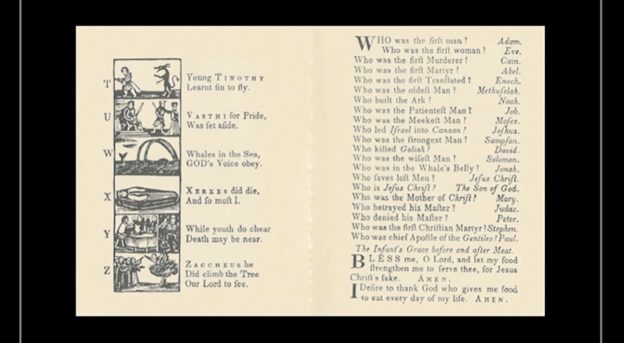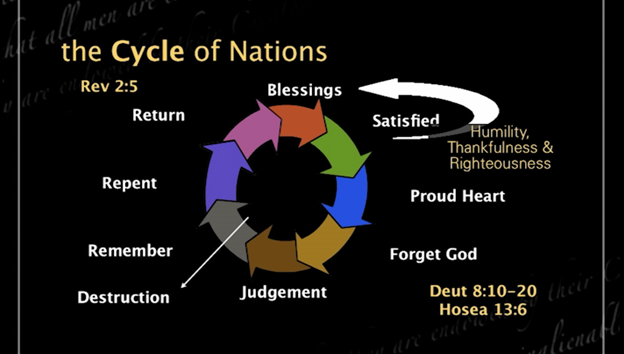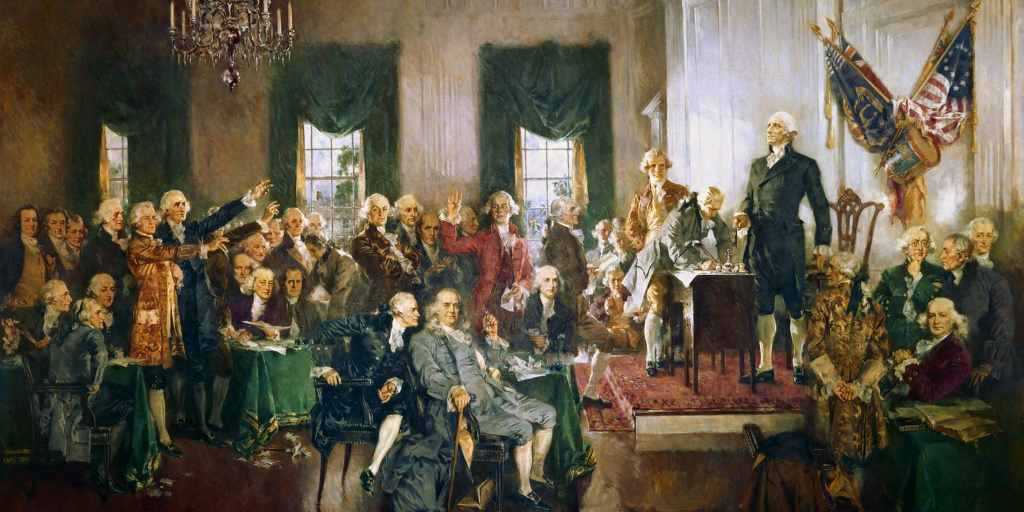This post is part 10 of a 12 part series about The Truth Project, an in-depth Christian Worldview experience led by Del Tackett and published by Focus on the Family.
In this tour, Dr. Del Tackett continues his discussion about the sphere of the state with an application in government in America. Tackett reminded the class that in the sphere of the state, there exists three entities: God, the King (short for civil magistrate), and citizens. However, when the king doesn’t consider God in the state, he soon thinks of himself as God. And Tackett quipped when the king thinks of himself as God, it’s not long before he becomes the devil.
According to Tackett, one such attempt to make human government a proper agency of God was the current form of American government. One way we can see how the government was subject to God is how its structure aligned with Isaiah 33:22. Isaiah wrote, “For the LORD is our judge; the LORD is our lawgiver; the LORD is our king; he will save us.” God’s three roles in this passage mirror the judicial (judge), legislative (lawgiver), and executive (king) branches of the United States Constitution.
Christian Foundations in American History
Tackett reminded us about the biblical foundations in American history. For instance, two books were best sellers in the American colonies. The Bible was the best seller and the second best seller was the New England Primer. This Primer was thoroughly saturated with biblical truths from the introduction of the alphabet to its inclusion of the Christian doctrinal catechism.

In addition, the founding of most of the Ivy League schools in America including Harvard, Princeton, and Columbia incorporated Christian elements into their early documents. For instance, Harvard’s original Latin motto was “Veritas Christo et Ecclesia” which translates to “Truth for Christ and the Church.” Similar things could be written about the founding of most of the early colleges and universities in America.
Many early American statesmen suggested they tied the success of their country (and ours) to the Christianity and Christian ethics. Here are a few of those quotes – emphasis mine):
- Gouverneur Morris: “Religion is the only solid basis of good morals; therefore education should teach the precepts of of religion, and the duties of man toward God.”
- Samuel Adams: “Let Divines, and Philosophers, Statesmen and Patriots unite their endeavours to renovate the Age, by impressing the Minds of Men with the importance of educating their little boys, and girls – of inculcating in the Minds of youth the fear, and Love of the Deity, and universal Phylanthropy; and in subordination to these great principles, the Love of their Country – of instructing them in the Art of self government, without which they never can act a wise part in the Government of Societys great, or small – in short of leading them in the Study, and Practice of the exalted Virtues of the Christian system”
- Benjamin Rush: “In contemplating the political institutions of the United States, I lament, that we waste so much time and money in punishing crimes, and take so little pains to prevent them. We profess to be republicans, and yet we neglect the only means of establishing and perpetuating our republican forms of government, that is, the universal education of our youth in the principles of christianity, by means of the bible;”
- Noah Webster: “In my view, the Christian religion is the most important and one of the first things in which all children, under a free government ought to be instructed.”
- George Washington: “Of all the dispositions and habits which lead to political prosperity, religion and morality are indispensable supports. In vain would that man claim the tribute of patriotism, who should labor to subvert these great pillars of human happiness, these firmest props of the duties of men and citizens. The mere politician, equally with the pious man, ought to respect and to cherish them. A volume could not trace all their connections with private and public felicity. Let it simply be asked: Where is the security for property, for reputation, for life, if the sense of religious obligation desert the oaths which are the instruments of investigation in courts of justice? And let us with caution indulge the supposition that morality can be maintained without religion. Whatever may be conceded to the influence of refined education on minds of peculiar structure, reason and experience both forbid us to expect that national morality can prevail in exclusion of religious principle.”
- John Adams: “Statesmen my dear Sir, may plan and speculate for Liberty, but it is Religion and Morality alone, which can establish the Principles upon which Freedom can securely stand“
- Daniel Webster: “To preserve the government we must also preserve morals. Morality rests on religion, if you destroy the foundation, the superstructure must fall. When the public mind becomes vitiated and corrupt, laws are a nullity and constitutions are but waste paper.”
It should be underscored that whenever these early American statesmen spoke of “religion,” it was understood to be Christianity. There were no Buddhist temples or Islamic Mosques in the American colonies or early American states. Instead, there were churches of different Christian denominations. To these statesmen, religion meant a form of Christianity.
The Foundation of Law: Christianity
The American government was built upon a deep foundation. It’s deeper than law and deeper than the Constitution. It is built upon Christianity and Christian ethics. The terms the founders used were “religion” and “morality”, but these are synonymous terms with Christianity and Christian ethics.
This foundation can be seen clearly in the Declaration of Independence. Thomas Jefferson wrote, “We hold these truths to be self-evident, that all men are created equal, that they are endowed by their Creator with certain unalienable Rights, that among these are Life, Liberty and the pursuit of Happiness.” Jefferson knew, along with the framers of the Declaration, that the rights of people did not come from the State. God gave the rights to the people.
But this Christian consensus did not persist in law. In 1869, Charles Eliot became President of Harvard. He appointed Christopher Langdell to be head of Harvard Law School. Both Eliot and Langdell believed in Darwinian evolution. They also believed that evolution should remake education, including law. Langdell did not believe in the foundation of law in biblical principles – he believed law “evolved” and introduced case law theory to further develop the legal practice.
At the turn of the 20th century, Supreme Court Justice Oliver Wendell Holmes articulated what law had become after it was unmoored from its biblical foundations. Holmes wrote, “The life of the law has not been logic; it has been experience … In order to know what it is, we must know what it has been, and what it tends to become.” To Holmes, law was not a fixed thing as if it were tethered to Scripture. Instead law was a movable thing, that looked like something once, is something else today, and will become something else tomorrow.
Where We Came From
Langdell’s and Holmes’ vision for American jurisprudence was not the original foundation for our society. Instead, Christianity birthed our republic. Though many today suggest that deists or pagans founded our country, it’s just not true. One of the more irreligious founding fathers, Benjamin Franklin, confessed a stunning admission of God’s handiwork in the creation of the new United States of America at the Constitutional Convention in 1787, Franklin wrote…
“how has it happened, Sir, that we have not hitherto once thought of humbly applying to the Father of lights to illuminate our understandings? In the beginning of the contest with G. Britain, when we were sensible of danger we had daily prayer in this room for the Divine Protection. — Our prayers, Sir, were heard, and they were graciously answered. All of us who were engaged in the struggle must have observed frequent instances of a Superintending providence in our favor. To that kind providence we owe this happy opportunity of consulting in peace on the means of establishing our future national felicity. And have we now forgotten that powerful friend? Or do we imagine that we no longer need His assistance. I have lived, Sir, a long time and the longer I live, the more convincing proofs I see of this truth — that God governs in the affairs of men. And if a sparrow cannot fall to the ground without his notice, is it probable that an empire can rise without his aid?”
Franklin was no deist in the modern understanding of the term. Instead, Franklin articulated an understanding of a God who was very involved in the affairs of people – even people in 17th century America. And Franklin spoke from the same cultural context that affirmed the truthfulness of the Bible and the importance of Christianity in society.

Application: America’s Call to Turn Back to God
Our country has experienced a tremendous Christian legacy throughout our history. However, we have lost and continue to lose much of that heritage. A first century church lost something as well just one generation after it was planted. Jesus spoke these words to the church in Ephesus, “Remember therefore from where you have fallen; repent, and do the works you did at first. If not, I will come to you and remove your lampstand from its place, unless you repent.” (Revelation 2:5). These same words spoken to the Ephesians could be well spoken to American Christians as well. Without repentance and turning back to the Lord, we too may lose our nation as well.
Header image courtesy of Wikimedia.



